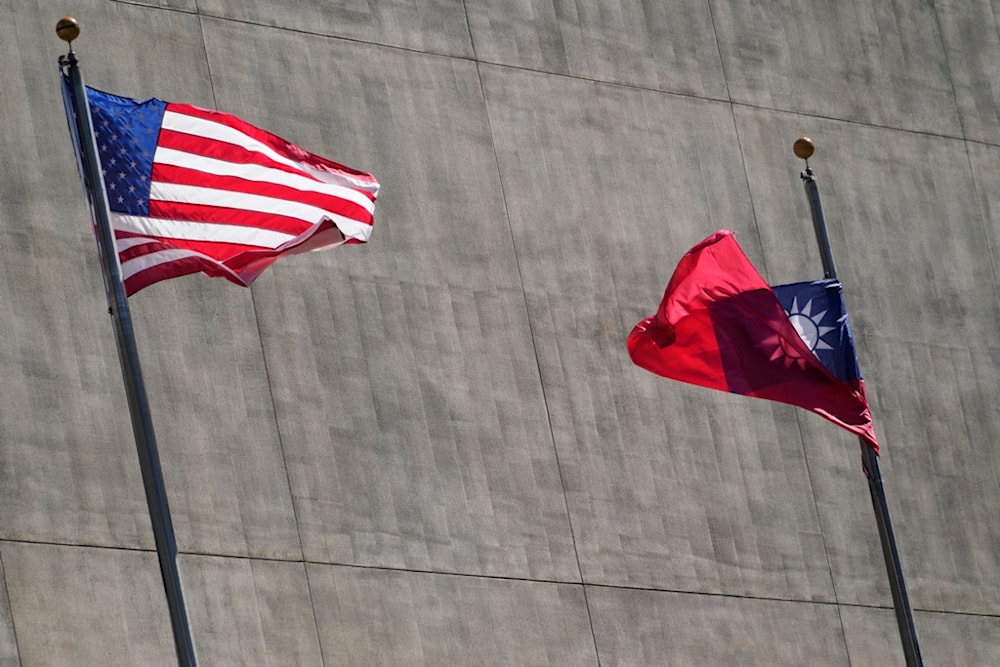In possible Taiwan war, US munitions can't sustain a week: Congressman
The congressman highlights the alarming findings of recent war-gaming scenarios.
-

US and Taiwan flags are displayed outside a hotel as Taiwan's president was staying in Los Angeles on April 4, 2023. (AP)
Congressman Mike Gallagher has voiced concerns over the US' preparedness for a conflict with China over Taiwan.
In a letter addressed to Deputy Secretary of Defense Kathleen Hicks, Gallagher highlighted the alarming findings of recent war-gaming scenarios, indicating that the United States would exhaust its supply of long-range, precision-guided munitions (PGMs) within a week in such a potential conflict.
The letter, delivered on Monday, emphasized the critical role of long-range PGMs, particularly anti-ship cruise missiles, in maintaining a strategic advantage.
Gallagher said that without an ample supply of these munitions, the US and partner forces would be compelled to operate in closer proximity to Chinese defensive capabilities.
The consequence of such a scenario, as outlined in the letter, is an increased risk to air and naval assets, along with the servicemen and servicewomen operating them.
"With no guarantees that a war in the Indo-Pacific would be limited to weeks or even months, the possibility that we may have to fight for an extended period without the most effective assets in our arsenal is deeply alarming," the letter read.
Read more: No to US interference in Taiwan's elections: China
The US is a heartbeat away from a lost world war: Foreign Policy
According to A. Wess Mitchell from Foreign Policy the US is dangerously close to defeat in a global conflict. Two of the three most strategically significant regions in the world are home to grave conflicts that demand American attention.
Mitchell warns that if China decides to attack Taiwan, the US would be dragged into a 3-front conflict, something the nation as well as its allies should be ready for.
The author believes that China's desire to move on to Taiwan will increase as Russia prepares for a protracted war in Ukraine and a new front opens in "Israel," emphasizing that if war breaks out, the US would find that crucial elements like geography are completely against it.
This would prove detrimental to the US which has vowed to protect Taiwan at all costs.
The current Congressional Strategic Posture Commission and the previous two U.S. national defense strategies both made it apparent that the U.S. military is not built to fight two major adversaries at once. Should China launch an assault on Taiwan, the US would face significant challenges in continuing to defend "Israel" and Ukraine while repelling China.
A "thinly stretched US military" with allies that are not well-equipped to "Defend themselves" can only mean defeat for the US in this case.
In addition to the disadvantage that comes with an army that has shrunk to its smallest size since WW2, the US will not be able to outproduce its rivals.
China's navy already surpasses that of the United States in the number of fleets, and every four years it grows by the same amount as the entire French Navy (roughly 130 vessels, based on the French naval chief of staff). In contrast, over the next ten years, the U.S. Navy intends to add 75 more ships.
Funding is another major disadvantage for the already painfully generous US. The national debt to GDP ratio in the United States nearly doubled during World War II, rising from 61 percent to 113 percent of GDP. In contrast, today's US would be entering a conflict with debt that already exceeds 100% of GDP.
This means the dept could increase to 200% of GDP, a catastrophic situation for the US economy.
Oil is another major concern as Iran and Russia, both on the US' rival list, are massive oil producers.
According to a recent analysis, a protracted closure of the Hormuz Strait amid a wider conflict in the Middle East could drive up oil prices to $100 per barrel and significantly raise inflationary pressures. China is one of the biggest holders of US debt, and a prolonged sell-off by Beijing might raise bond rates and put additional pressure on the economy, meaning shortages of everything from electronics to construction materials would affect Americans.
The human cost would be of grave concern as scores of US military members would inevitably die. ith American dissatisfaction already at a high- this could be disastrous for any administration.
The author argues that this scenario is not a "theoretical contingency" but rather a real and imminent possibility the US is better prepared for.
Mitchell calls for the US to fund even further their allies from Ukraine to "Israel" to Taiwan, never mind the growing concerns of Americans in their own nation.
He also calls on US allies in Europe and NATO members to "get more serious about security," explaining that less than one-third of them are meeting their pledge to dedicate at least 2% of GDP to defense. Major Western European nations promised to place brigade-sized units on NATO's eastern flank during the bloc's summit in Madrid more than a year ago, but they haven't done so yet.
Read more: Australia sails warship through Taiwan Strait amid increased tensions

 5 Min Read
5 Min Read










